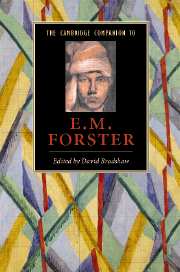Book contents
- Frontmatter
- Introduction
- 1 Forster’s life and life-writing
- 2 Bloomsbury and other values
- 3 Forster and England
- 4 Hellenism and the lure of Italy
- 5 Forster and the short story
- 6 Forster and the novel
- 7 Forsterian sexuality
- 8 Forster and women
- 9 A Room with a View
- 10 Howards End
- 11 Maurice
- 12 A Passage to India
- 13 Forster and modernism
- 14 Forster as literary critic
- 15 Filmed Forster
- 16 Postcolonial Forster
- Further reading
- Index
- Series List
5 - Forster and the short story
Published online by Cambridge University Press: 28 September 2007
- Frontmatter
- Introduction
- 1 Forster’s life and life-writing
- 2 Bloomsbury and other values
- 3 Forster and England
- 4 Hellenism and the lure of Italy
- 5 Forster and the short story
- 6 Forster and the novel
- 7 Forsterian sexuality
- 8 Forster and women
- 9 A Room with a View
- 10 Howards End
- 11 Maurice
- 12 A Passage to India
- 13 Forster and modernism
- 14 Forster as literary critic
- 15 Filmed Forster
- 16 Postcolonial Forster
- Further reading
- Index
- Series List
Summary
Forster's short stories are commonly held to be insubstantial, lacking the sophistication associated with other twentieth-century practitioners of the form. They are deemed to be governed by a whimsical fascination with the supernatural, and to represent light relief from the novels. Without making excessive counter-claims, this essay seeks to demonstrate that Forster's stories are, on occasion, more technically interesting than is sometimes assumed, revealing some affinities with the work of other modernist writers, and betraying some intriguing points of contact with the novels.
Forster's reputation as a short story writer rests, principally, on the two volumes of stories published during his lifetime, The Celestial Omnibus (1911) and The Eternal Moment (1928). These twelve stories were combined in 1947 to form the Collected Short Stories; the same twelve published in the Abinger Edition as The Machine Stops and Other Stories. In his editorial introduction to the Abinger Edition, Rod Mengham correctly observes that 'Forster's decision in the question of what should, or should not be collected was a significant act that needs to be recognized' (MS, p. vii); but Mengham also points out that the title Collected Short Stories was 'grossly inaccurate' (MS, p. vii), even though sanctioned by Forster. The stories collected in 1947 were all written before the First World War, and omit all of those (complete) stories published posthumously as The Life to Come and Other Stories (1972). Introducing this posthumous collection, Oliver Stallybrass indicates that the stories cover the whole extent of Forster's career, 'ranging, probably, from 1903 to 1958, with some revision as late as 1962' (LC, p. vii).
- Type
- Chapter
- Information
- The Cambridge Companion to E. M. Forster , pp. 77 - 91Publisher: Cambridge University PressPrint publication year: 2007
- 3
- Cited by

